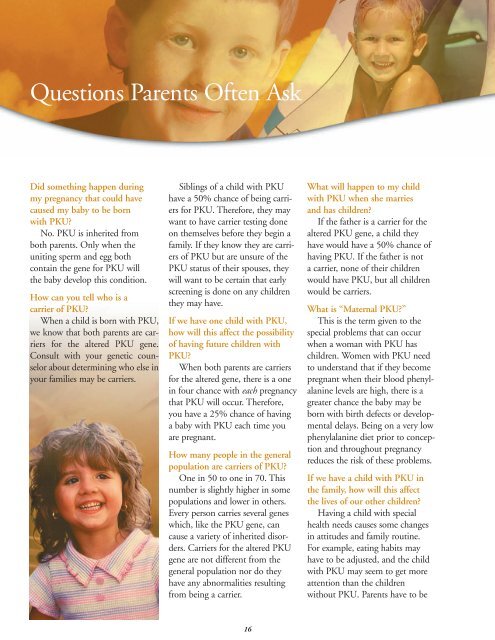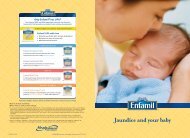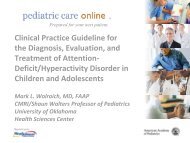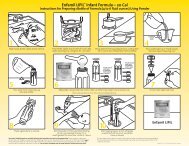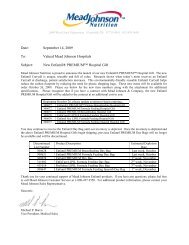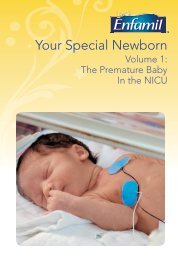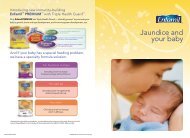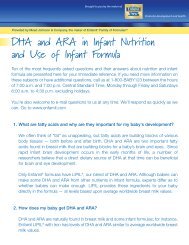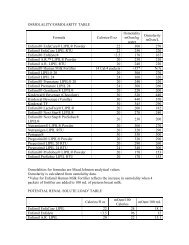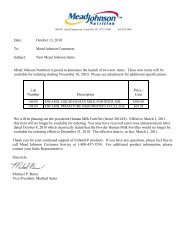Guide to PKU - Mead Johnson Nutrition
Guide to PKU - Mead Johnson Nutrition
Guide to PKU - Mead Johnson Nutrition
You also want an ePaper? Increase the reach of your titles
YUMPU automatically turns print PDFs into web optimized ePapers that Google loves.
Questions Parents Often AskDid something happen duringmy pregnancy that could havecaused my baby <strong>to</strong> be bornwith <strong>PKU</strong>?No. <strong>PKU</strong> is inherited fromboth parents. Only when theuniting sperm and egg bothcontain the gene for <strong>PKU</strong> willthe baby develop this condition.How can you tell who is acarrier of <strong>PKU</strong>?When a child is born with <strong>PKU</strong>,we know that both parents are carriersfor the altered <strong>PKU</strong> gene.Consult with your genetic counselorabout determining who else inyour families may be carriers.Siblings of a child with <strong>PKU</strong>have a 50% chance of being carriersfor <strong>PKU</strong>. Therefore, they maywant <strong>to</strong> have carrier testing doneon themselves before they begin afamily. If they know they are carriersof <strong>PKU</strong> but are unsure of the<strong>PKU</strong> status of their spouses, theywill want <strong>to</strong> be certain that earlyscreening is done on any childrenthey may have.If we have one child with <strong>PKU</strong>,how will this affect the possibilityof having future children with<strong>PKU</strong>?When both parents are carriersfor the altered gene, there is a onein four chance with each pregnancythat <strong>PKU</strong> will occur. Therefore,you have a 25% chance of havinga baby with <strong>PKU</strong> each time youare pregnant.How many people in the generalpopulation are carriers of <strong>PKU</strong>?One in 50 <strong>to</strong> one in 70. Thisnumber is slightly higher in somepopulations and lower in others.Every person carries several geneswhich, like the <strong>PKU</strong> gene, cancause a variety of inherited disorders.Carriers for the altered <strong>PKU</strong>gene are not different from thegeneral population nor do theyhave any abnormalities resultingfrom being a carrier.What will happen <strong>to</strong> my childwith <strong>PKU</strong> when she marriesand has children?If the father is a carrier for thealtered <strong>PKU</strong> gene, a child theyhave would have a 50% chance ofhaving <strong>PKU</strong>. If the father is nota carrier, none of their childrenwould have <strong>PKU</strong>, but all childrenwould be carriers.What is “Maternal <strong>PKU</strong>?”This is the term given <strong>to</strong> thespecial problems that can occurwhen a woman with <strong>PKU</strong> haschildren. Women with <strong>PKU</strong> need<strong>to</strong> understand that if they becomepregnant when their blood phenylalaninelevels are high, there is agreater chance the baby may beborn with birth defects or developmentaldelays. Being on a very lowphenylalanine diet prior <strong>to</strong> conceptionand throughout pregnancyreduces the risk of these problems.If we have a child with <strong>PKU</strong> inthe family, how will this affectthe lives of our other children?Having a child with specialhealth needs causes some changesin attitudes and family routine.For example, eating habits mayhave <strong>to</strong> be adjusted, and the childwith <strong>PKU</strong> may seem <strong>to</strong> get moreattention than the childrenwithout <strong>PKU</strong>. Parents have <strong>to</strong> be16


